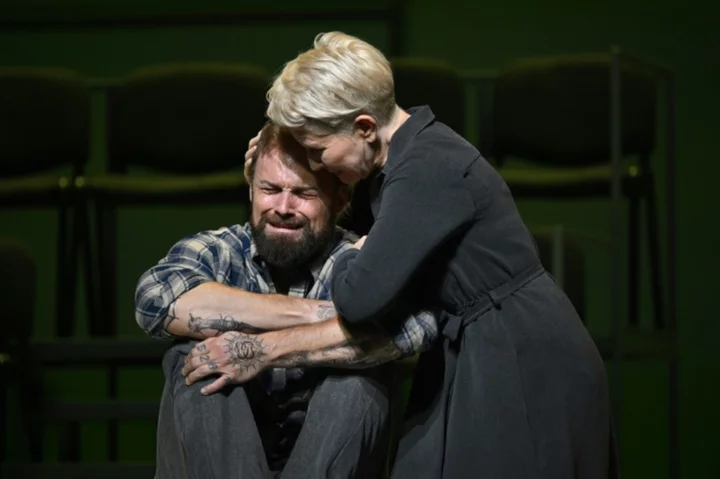It's been three decades since Sister Helen Prejean entered the public eye for her memoir "Dead Man Walking," a recounting of her relationship with a death row inmate whose execution she witnessed.
The 1993 best-selling memoir was made into an Oscar-winning film starring Susan Sarandon and Sean Penn, as well as an opera examining love, pain and redemption that after twenty-some years on the stage is core to the contemporary canon, and this Tuesday gets its Met debut in New York.
The operatic version of "Dead Man Walking" was composed by Jake Heggie, with Terrence McNally penning the libretto. This year's haunting Met production features mezzo-soprano Joyce DiDonato as Sister Helen.
Bass-baritone Ryan McKinny plays the death-row inmate Joseph De Rocher, while soprano Latonia Moore takes on the role of Sister Rose, and mezzo-soprano Susan Graham -- who sang Helen Prejean in 2000 when it premiered in San Francisco -— plays De Rocher's mother.
The real Sister Helen is now 84 years old, and has spent the latter half of her life as a leading American advocate urging the abolition of capital punishment, which remains legal in many US states.
After witnessing the death by electric chair of Elmo Patrick Sonnier -- who the character of Joseph De Rocher is based on -- she has accompanied a number of prisoners to their executions and hopes her book, the film and the opera can "wake people up" to her belief that the death penalty is morally wrong.
"I'm just so glad the story, and the reality is getting out to people," she told AFP backstage during an intermission of the final dress rehearsal prior to Tuesday's opening.
Executions are "a secret ritual," she said, which few people bear witness to, recalling a Latin American expression she encountered while working in the region: "What the eye doesn't see the heart can't feel."
"So we need art to pull back the curtain and bring people into the reality of it."
- Forgiveness? -
The Met's stark staging of "Dead Man Walking" -- directed by Ivo van Hove -- begins with a short film depicting the murder and rape for which De Rocher was convicted.
In the next moment Sister Helen, who begins a correspondence with the convict as part of her Order's community outreach, is preparing to meet him at Louisiana State Penitentiary in Angola.
Throughout the performance the two main characters are frequently onstage together, without the partitions or shackles that typically characterize the production -- letting the austere stage become an emotional prison of its own.
"It's an opera about the death penalty, but in my mind it's really not -- it's about, can you see the humanity in everyone? Particularly someone who's done terrible things?" McKinny, who plays De Rocher, told AFP.
"It's really about seeing everyone involved as human beings and asking, 'Is forgiveness possible?'"
For Sister Helen, it's also about helping people to comprehend suffering -- not only that carried out by individuals, but the kind perpetuated by society.
"There's the... thing of blaming individuals, we never look at the context of the culture in the society," she said, adding that beyond asking who did what, it's important to ask, "What did we do wrong?"
-'American pride' -
The Met's production of "Dead Man Walking" is part of the 143-year-old institution's shift towards more contemporary works, as it aims to diversify its audiences that traditionally skew elderly and white.
In recent years the company has found success at the box office with operas by living composers, including "The Hours" and "Fire Shut Up In My Bones."
Both are returning this season. The prestigious house will also stage "X: The Life and Times of Malcolm X" in November.
For Moore, the star American soprano who plays Sister Rose, the Met's move towards the contemporary is "necessary to show that we support American opera composers, and American artists here."
"For years it's been such an international art form simply because opera is not really in the forefront of the arts here in America," she told AFP in her dressing room.
But in recent years Moore said she's felt that change, giving her a sense of "American pride."
"Of course we want the classics, but if we don't do something to move forward, and we don't incorporate our own culture into this art form, then the art form will die in this country."
Moore added that it's also about broadening the appeal of opera to less-informed audiences.
"For those people that think operas are for fuddy-duddies, and its just the horns and 'Figaro, figaro,'" she said contemporary works like "Fire" or "Dead Man Walking" offer something "they can really touch and relate to."
"It's tangible to them emotionally."
mdo/bfm









